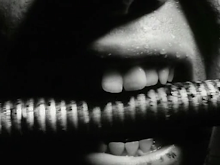The opening credit sequence establishes two of the most prevalent and effective motifs explored in "Il Deserto Rosso": the manipulation of focus and sound. First is a single shot of a treeline, which is set against a gray sky, completely out of focus. The shot pans over to a power plant, clouded in smoke, then cuts to an assemblage of ugly exterior shots to the point where one hopes the shots stay out of focus. Throughout the sequence Antonioni uses a droning soundscape of industrial noises which are blended with a haunting female voice, strangely provoking either lament or hope.
A few loud bursts of fire shooting from a rig announce the story's beginning. The lovely Monica Vitti is once again Antionioni's socially disconnected protagonist, this time Giuliana, who is introduced guiding her young son amongst the backdrop of a worker's strike at the plant. Her behavior instantly seems odd as she approaches a man and asks to buy his sandwich, which he is in the process of eating. She seems desperate and confused, but her well-groomed beauty and opulent, green pea coat show her obvious wealth.

One learns through dialogue that she is a psychologically troubled woman whose everyday consciousness has become seriously effected by a traumatic car accident. Despite being treated in a psychiatric hospital, she is far from recovered - seen through her constantly jittery and disoriented behavior. She eventually meets with her husband Ugo, who has either a striking lack of sympathy for his wife's condition or a complete ignorance of the existential angst that it has led her to.
Afraid to be alone, she confides in his partner Corrado (Richard Harris) instead. He's a warmer man, but still very much a product of his endlessly busy environment. As she joins him on a trip to recruit workers for a project overseas, she sees that he is trapped in a meaningless cycle of work. This cycle is externalized in a conversation Corrado has with one of the potential workers' wives, who asserts that he will have trouble recruiting her husband because the separation between them would be too troubling. Such a separation seems to be at the core of each of the characters' wounds, and the relationship Giuliana forms with Corrado is as cyclical as anything else within the film's world.
The film breaks free of its stylistic and thematic limbo in only one scene, when Giuliana tells her son a story to comfort him when he is apparently suffering from an apparent neurological problem. The story is about a young girl on a deserted beach who seeks isolation, until she is disturbed by ships approaching the shore in the distance. Antonioni recreates the tale, allowing his color palette to break down, contrasting Giuliana's reality with a varying amount of shimmering color. The scene is a counterpoint to the rest of the film, ironically using the device of storytelling to "escape" the reality created on screen.
"Red Desert" is an uncomfortable movie to say the least. It subjects the viewer to such dreadful, existential coldness which is more unrelenting than any of Antonioni's previous works. There is a constant onslaught of eerie, disquieting sound design creeping throughout the scenes slowly destroying objectivity. The surreal ugliness of the primary color pallete is equally effective in creating this atmosphere. Antonioni uses these objective elements to completely convey Giuliana's psychological torment and the effect is undeniably haunting.

No comments:
Post a Comment